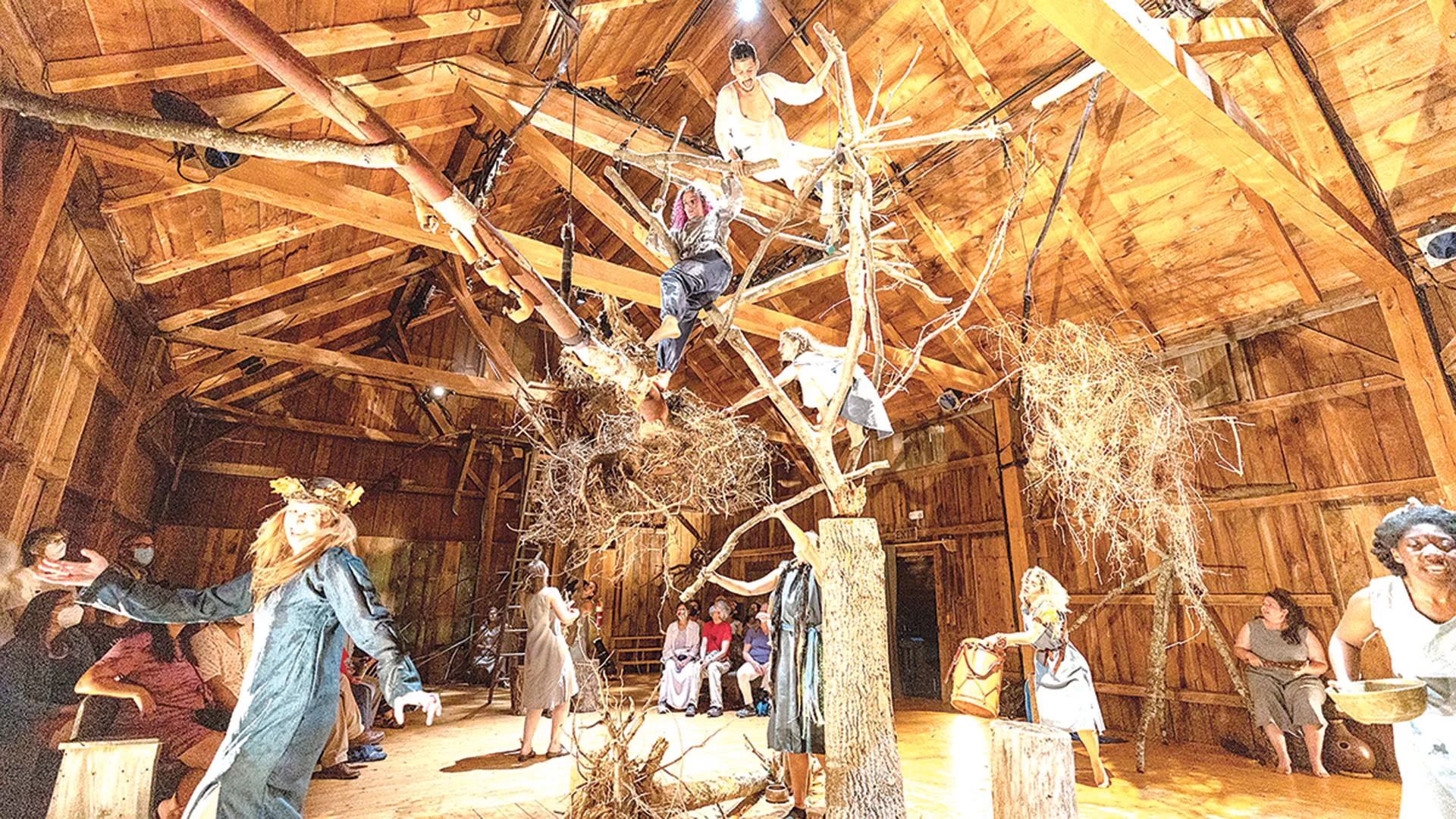
Franklin County Businesses Face Challenges, but Also Opportunity
Big Ideas in Small Towns

Lucy Damkoehler has developed a strong following from both within and outside Franklin County for her bakery and cooking classes.
When Lucy Damkoehler returned to Western Mass. after 20 years away, she opened a bakery in a town she knew well — Bernardston, to be exact, with its population of 2,000.
That was in 2018. Today, Sweet Lucy’s Bakeshop is thriving, demonstrating, like many other businesses already have, that it’s possible to succeed in a county whose 26 communities total around 71,000 residents — less than half of Springfield alone.
“It took off right away,” she said. “My prices were competitively high. I knew the cost of food was going up and the cost of labor was going up, so I priced it so I didn’t have to change my prices too often. But people didn’t complain about it, and I felt like it was doing pretty well.”
When COVID shut down much of the world, Damkoehler pivoted to a concept called Take & Bake Meals, which, at its height, was sending 50 to 60 meals out the door each day, which wound up expanding her reach and widening her exposure.
“We were getting people from Connecticut, from New York, discovering us,” she recalled, and those days partly explain why her customer base went from 90% local before 2020 to a ratio today of about 60% repeat customers — who come anywhere from every day to once a month — and 40% travelers checking out the bakery for the first time.
And Damkoehler’s success continues; she used a crowdfunded grant and a bank loan to build an addition, doubling her kitchen space and allowing her to begin offering cooking classes last September. She now employs six full-time bakers and six front-of-house staff, and is looking to hire a chef instructor as well.
“It blows my mind that I’ve only had one class that’s had to cancel due to low enrollment. They usually sell out within a couple of weeks, if not days,” she told BusinessWest. “It shows there’s a major need for that part of the business; there’s nothing like that around here. We’re doing kids’ classes now, too.
“I’m amazed every day that we’re able to do this successfully,” she added, especially in a community of just over 2,100 residents. “The prices are not cheap. But people recognize the value, and they appreciate it, and they’re willing to spend more money on something that’s done right. It doesn’t scare people away.”
So that’s what Damkoehler brought to the table: talent, quality, drive, and the instincts to pivot to what the market needed, which, both during the pandemic and with her classes, generated further opportunities for growth. Meanwhile, other businesses throughout this mostly rural county bring their own differentiators, but they also testify to a supportive, if small, community.
“Business owners here who are thriving have really committed, loyal customers. They have customers who love to come out and spend time there, spend their dollars with them, and they’re focused on providing a really great experience every time someone comes in,” said Hannah Rechtschaffen, director of the Greenfield Business Assoc. (GBA).
“One thing that I hear from some business owners is a sense of community and mutual support,” she added, noting that one of the GBA’s goals is to keep building opportunities for business owners to know each other better, so they can recommend each other.
“I think it’s organizations like ours and like the chamber that are able to listen to business owners and respond and really be another set of hands in their business success. That’s not overrated when you’re wanting to have a brick-and-mortar presence. So I hope businesses will think about opening here; I hope businesses will think about opening a second location here.”
“We were getting people from Connecticut, from New York, discovering us.”
To that end, Rechtschaffen added, “when we’re in conversation with Greenfield Community College about getting an internship program going, or when we’re in conversation with the Franklin County CDC about small-business support and entrepreneurship, all of those relationships are so, so crucial. None of us want to feel like we’re toiling away alone. We want to feel like we’re part of a larger ecosystem.”
Jessye Deane, executive director of the Franklin County Chamber of Commerce and Regional Tourism Council, agreed.
“Partnership and collaboration are the special ingredients in Franklin County. The way our communities come together to support our small businesses, it’s not like anything I’ve seen elsewhere,” she said.
“What I love to see here are thoughtful partnerships and strategies around how to best support business owners in filling in some gaps and resources that some more populated areas have, and how to attract different industries to the area,” she continued, touting, as Rechtschaffen did, the partnership between the chamber and GBA, but also Greenfield Community College, the CDC, and various economic-development entities.
“We want everyone’s business to be as successful as possible and have as many resources as they can tap into to ensure that success,” Deane said. “We wake up every day asking how to best support them.”
Declining Numbers
Such partnerships and mutual support are especially meaningful in a county that, after years of plateauing population, has seen those numbers start to creep downward, especially in the small towns beyond Greenfield and Deerfield.
“Certainly, population decline — or the projection of population decline we see — is a pretty major threat to many rural parts of Massachusetts,” said Linda Dunlavy, executive director of the Franklin Regional Council of Governments. “As Baby Boomers age, we need help, and not attracting young people to our region will be a concern for us. So we’re working on that.

Double Edge Theatre in Ashfield is just one example of the many cultural offerings in Franklin County.
“But population decline also hurts Franklin County and its rural areas because so many state and federal funding formulas, the distribution of aid money to municipalities, is based on population,” she continued. “So as our population decreases, the amount of money we have for infrastructure improvements, for education, etc., also decreases, which compounds the problem: how do we get people to come to our region if we’re not caring for our infrastructure, our assets, adequately?”
Dunlavy, who was named one of the Difference Makers for 2024 by BusinessWest, has been working for the benefit of Franklin County for decades, so she understands its assets — from arts and culture to outdoor recreation to that supportive business community others mentioned — but she understands the challenges of an aging, shrinking population base, too.
“Because we’re so rural, we have to work together,” she told BusinessWest. “We are a very collaborative region, probably one of the most collaborative regions in Massachusetts, because all the regional organizations are working together. We combine services of municipalities, our businesses work together, and they are served by strong regional support systems. It’s a great region to live in — if you know about us.”
A.J. Bresciano, first vice president and commercial loan officer at Greenfield Savings Bank (GSB), has been lending in Franklin County for the past 16 years, and he feels good about the current strength of business activity in the region.
“In terms of business lending, I think there’s some growth and some optimism, post-pandemic, in starting businesses and seizing opportunities to capitalize on improving economic markets. I think there is some opportunity for people with great ideas and a passion for what they do to come in and start something new,” he told BusinessWest.
That said, “there are certainly some challenges in the interest-rate environment,” he added, especially on the residential side, where higher rates and a shortage of housing have taken away the ‘churn’ of a vibrant market. “But I think that will change. Hopefully we’ll see rates start to come down in the near future, which will give people an opportunity to go out and seek new opportunities. We’re pretty optimistic about what the future holds.”
On the plus side, “there’s a lot of interest in this market because it’s less expensive than other markets that are overdeveloped. So a lot of borrowers see opportunity here,” said Peter Albero, chief financial officer and treasurer, noting that GSB originated $100 million in commercial loans and $70 million in residential loans last year. “The residential side is still a little bit lower … but the commercial side is very strong. A lot of banks are competing for strong borrowers.”
The aging of the population has created a fair amount of business turnover, Bresciano added, as long-time business owners are looking to retire and move into the next chapter of their lives.
“So there’s definitely opportunity for someone else to come in with new ideas, new ambitions, and to cultivate a new environment,” he said, pointing to one project — the conversion of the former Wilson’s Department Store in downtown Greenfield to a mixed-use property — as an example of forward thinking.
“None of us want to feel like we’re toiling away alone. We want to feel like we’re part of a larger ecosystem.”
For her part, Deane has seen a pipeline emerge of younger leaders in many Franklin County communities as older leaders, like those older business owners, look to retirement. “I’m excited about the leadership we’re seeing step into those roles,” she said.
Plenty to Promote
Rechtschaffen is acutely aware of what a spread-out county like Franklin faces in terms of housing, transportation, and access to amenities, but she tends to light up when talking about what she loves about the region — and there’s a lot of that.
“We have so much amazing outdoor arts, outdoor activities, whitewater rafting, skiing, theater … there are so many things. So I always want to make sure that people know what there is to visit up here.”
The target audience isn’t just visitors from afar, though.
“We have an advantage in Franklin County, which is that people really do want to support local, so it’s important that we have the right retail mix and experience mix here for people to be able to do that,” Rechtschaffen said, which is the impetus behind efforts like the “find it in Greenfield” campaign running on Bear Country radio and through other outlets.
“A lot of people don’t realize what’s so close by. So getting the word out can be a challenge,” she added. “We’re really trying to keep beating that drum and making sure that things are affordable, things are accessible, and we’re bringing businesses into Greenfield and Franklin County that people really want. That’s also a crucial part of the puzzle.”
Dunlavy has helped put many pieces in place, from north-south rail to broadband access to a planned partnership with other regional councils of government on a Connecticut River climate-resiliency plan.
“You do nothing alone. Everything takes partnership and many people working together,” she said. “And I like that part of the job. I like that challenge, and I like that focus. I’m never bored, ever. There’s always something to work on and always something to think about.”
Rechtschaffen never stops thinking about Franklin County, either.
“This is really creative work,” she said, “to be problem solving, to be listening, to be connecting people with one another so that their business can thrive, maybe in ways they didn’t think about. I really love all of this work to grow Greenfield and Franklin County in a way that feels good, for as many people as possible.”




